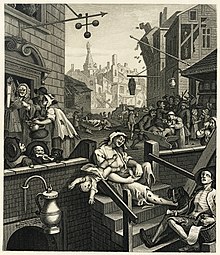Causes

A complex mixture of genetic and environmental factors influences the risk of the development of alcoholism. Genes that influence the metabolism of alcohol also influence the risk of alcoholism, as can a family history of alcoholism. One paper has found that alcohol use at an early age may influence the expression of genes which increase the risk of alcohol dependence. Individuals who have a genetic disposition to alcoholism are also more likely to begin drinking at an earlier age than average. A younger age of onset of drinking is associated with an increased risk of the development of alcoholism, and about 40 percent of alcoholics will drink excessively by their late adolescence. It is not entirely clear whether this association is causal, and some researchers have been known to disagree with this view.
Severe childhood trauma is also associated with a general increase in the risk of drug dependency. Lack of peer and family support is associated with an increased risk of alcoholism developing. Genetics and adolescence are associated with an increased sensitivity to the neurotoxic effects of chronic alcohol abuse. Cortical degeneration due to the neurotoxic effects increases impulsive behaviour, which may contribute to the development, persistence and severity of alcohol use disorders. There is evidence that with abstinence, there is a reversal of at least some of the alcohol induced central nervous system damage. The use of cannabis was associated with later problems with alcohol use. Alcohol use was associated with an increased probability of later use of tobacco and illegal drugs such as cannabis.
Availability
Alcohol is the most available, widely consumed, and widely abused recreational drug. Beer alone is the world's most widely consumed alcoholic beverage; it is the third-most popular drink overall, after water and tea. It is thought by some to be the oldest fermented beverage.
Gender difference
Based on combined data in the US from SAMHSA's 2004–2005 National Surveys on Drug Use & Health, the rate of past-year alcohol dependence or abuse among persons aged 12 or older varied by level of alcohol use: 44.7% of past month heavy drinkers, 18.5% binge drinkers, 3.8% past month non-binge drinkers, and 1.3% of those who did not drink alcohol in the past month met the criteria for alcohol dependence or abuse in the past year. Males had higher rates than females for all measures of drinking in the past month: any alcohol use (57.5% vs. 45%), binge drinking (30.8% vs. 15.1%), and heavy alcohol use (10.5% vs. 3.3%), and males were twice as likely as females to have met the criteria for alcohol dependence or abuse in the past year (10.5% vs. 5.1%).
Genetic variation
There are genetic variations that affect the risk for alcoholism. Some of these variations are more common in individuals with ancestry from certain areas, for example Africa, East Asia, the Middle East and Europe. The variants with strongest effect are in genes that encode the main enzymes of alcohol metabolism, ADH1B and ALDH2. These genetic factors influence the rate at which alcohol and its initial metabolic product, acetaldehyde, are metabolized. They are found at different frequencies in people from different parts of the world. The alcohol dehydrogenase allele ADH1B*2 causes a more rapid metabolism of alcohol to acetaldehyde, and reduces risk for alcoholism; it is most common in individuals from East Asia and the Middle East. The alcohol dehydrogenase allele ADH1B*3 also causes a more rapid metabolism of alcohol. The allele ADH1B*3 is only found in some individuals of African descent and certain Native American tribes. African Americans and Native Americans with this allele have a reduced risk of developing alcoholism. Native Americans, however, have a significantly higher rate of alcoholism than average; risk factors such as cultural environmental effects e.g. trauma have been proposed to explain the higher rates. The aldehyde dehydrogenase allele ALDH2*2 greatly reduces the rate at which acetaldehyde, the initial product of alcohol metabolism, is removed by conversion to acetate; it greatly reduces the risk for alcoholism.
A genome-wide association study of more than 100,000 human individuals identified variants of the gene KLB, which encodes the transmembrane protein β-Klotho, as highly associated with alcohol consumption. The protein β-Klotho is an essential element in cell surface receptors for hormones involved in modulation of appetites for simple sugars and alcohol. A GWAS has found differences in the genetics of alcohol consumption and alcohol dependence, although the two are to some degree related.
Comments
Post a Comment